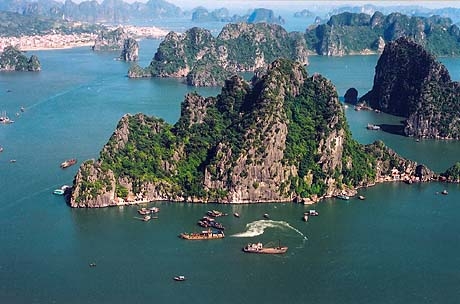Halong Bay- One of Vietnam’s two world natural heritages recognized by UNESCO
Halong Bay has been recognized as a World Natural Heritage not only for its thousands of natural islands, but also for its geographical and geomorphologic values. It is said that Halong Bay is a legendary world and one of the most magnificent scenic spots in Vietnam as well.
Halong Bay in Quang Ninh province has been recognized as a World Natural Heritage not only for its thousands of natural islands since 1994, but also for its geographical and geomorphologic values since 2000. It is said that Halong Bay is a legendary world and one of the most magnificent scenic spots in Vietnam as well.
Situated in North-East of Vietnam (150km from Hanoi), the Bay is in the Gulf of Tonkin which comprised of regions of Halong City, the township of Cam Pha, and a part of the island district of Van Don. It abuts Cat Ba Island in the southwest. Toward the west is the coastline 120km long. The site is 1553 sq.km with 1969 islands of various sizes, of which 989 have been named.
Viewed from above, Halong Bay resembles a geographic work of art. While exploring the bay, tourists who travel to Vietnam feel lost in a legendary world of stone islands. Halong bay is also a region of highly-concentrated biological diversity with many ecosystems of salt water-flooded forests, coral reefs, and tropical forests featuring thousands of species of animal and plant life.

Aesthetic value
The permanent beauty of Ha Long is created by three factors: stone, water and sky. Ha Long’s island system is multicolored with a variety of shapes and can be regarded as a water-color, a work of art. The islands, scattered all round, have different shapes which provoke the imagination: Dinh Huong (Incense Burner) implies spiritual significance, Ga Choi (Fighting Cocks) the symbol of Viet Nam tourism, Con Coc (Toad) recalls the passage of time, waiting thousands of years to seek justice in Heaven. There are islands that resemble a resplendent throne, a Vietnamese mother’s curved back carrying her child, a roof, an old man, a human head and so on.
Within the bigger islands are great attractions. Dau Go Cave (Wooden Stakes) dazzles the senses with many huge stalactites hanging poised in mid air and stalagmites growing majestically upwards. Then there is Thien Cung Grotto (Heavenly Palace) with its small, narrow entrance, but inside looking like a marvelous palace, and many other caves each has its own attractions and beauty.
Ha Long’s sea is always the same, blue, smooth and still. Ha Long has its own beauty by seasons. In spring, buds of trees burst on limestone islands. In summer, it is cool and clean with many sparkling sun rays reflecting from the sea’s surface. In autumn, especially at night, moonlight illuminates the mountains so they appear like gold, inlaid into the earth. In winter, with pervasive frost, Ha Long is glamorous as “a floating flower basket on smooth wave” (by writer Nguyen Tuan).

Karst geomorphologic value:
Ha Long Bay is a mature karst landscape developed during a warm, wet, tropical climate. The sequence of stages in the evolution of a karst landscape over a period of 20 million years requires a combination of several distinct elements including massive thickness of limestone, a hot wet climate and slow overall tectonic uplift.
The bio diversity value
Bio-diversity is an important natural resource and needs to be preserved and conserved to maintain the ecological balance of the whole region. Bio-diversity is the general term used to reflect diversify and abundance in nature and includes all living things.
The total number of plant species living on the rugged islands in Ha Long Bay is still not known, as many islands remain unexplored. There are probably over a thousand species of plants, the distribution of which is not uniform. Instead, several different communities (species of plants that always grow together) are found, such as: mangrove, seashore plants, those of the slopes or sheer cliffs, the summit plants and those that grow around the mouth of caves and in gullies. .
In 2002 a survey on assessing and auditing Ha Long Bay’s bio-diversity was conducted by management authorities and researchers. They surveyed 9 areas in Zone 1 of the World Heritage and all sites had maintained its bio-diversity and species diversity, and more new species were discovered.
Evaluation and Praises
Throughout the ages many famous men, from both home and abroad, when faced with the beauty of Halong’s sky and water have sung its praises in different ways, especially in poems.
In the 15th Century, Nguyen Trai (1380 – 1442), a great national poet visited Halong and spoke of:
“The way to Van Do has so many mountains
Nature has produced a wonder in the immense space
The vast blue sea looks like a grandiose mirror
Reflecting innumerable black mountains”.
Over 100 years ago, the French Journalist John Rey praised Ha Long:
“ In the brilliant light of the tropical sun, the sea surface, dark and light, here and there in the shadow of limestone mountains, is really an indescribable, fanciful scene. Sunset looks like a flaring fire, throwing all the islands into a fairyland.”
Nowadays, many domestic and international politicians, poets, cultural celebrities and tourists make the same comment when they visit Halong Bay: “If you haven’t visited Ha Long Bay, you haven’t been to Viet Nam.”
In recent years, Halong Bay has been honored to welcome many international delegations, including the leaders of many countries of the world.


.jpg)








.jpg)








Comments